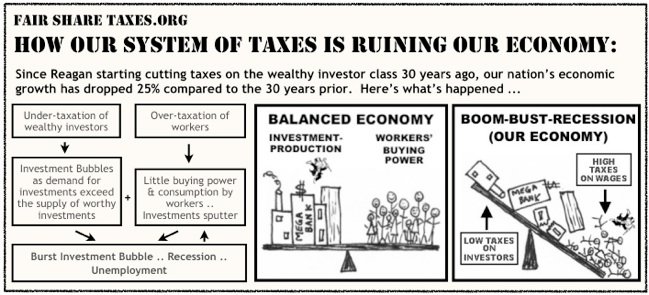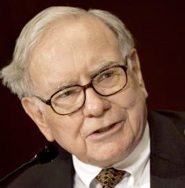SOME QUOTATIONS - MOSTLY FROM THE WEALTHY AND MOSTLY IN FAVOR OF INCREASED TAXES ON THE WEALTHY

"An imbalance between rich and poor is the oldest and most fatal ailments of all republics."
- Plutarch, Greek historian, c.100 A.D.
“Where there is an income tax, the just man will pay more and the unjust less on the same amount of income.”
- Plato, Greek philosopher, c. 400 B.C.
"Where there is an income tax, the just government will tax the same rate on all income, be it on wages from work or gains from investment."
-Peter Gloor, U.S. tax activist, 2012 A.D.

“The necessaries of life occasion the great expense of the poor. They find it difficult to get food, and the greater part of their little revenue is spent in getting it. The luxuries and vanities of life occasion the principal expense of the rich, and a magnificent house embellishes and sets off to the best advantage all the other luxuries and vanities which they possess …. It is not very unreasonable that the rich should contribute to the public expense, not only in proportion to their revenue, but something more than in that proportion.”
-
-Adam Smith in "The Wealth of Nations," 1776, Considered the father of economics and one of the first advocates of capitalism
"The power of taxing people and their property is essential to the very existence of government.''
- James Madison, "Father of the Constitution," "Father of the Bill of Rights," 4th President
"Why shouldn't the American people take half my money from me? I took it all from them."
- Edward Filene, founder of Filene's Department Stores

-
-President Franklin Delano Roosevelt, 32nd President
-
-

"The hardest thing in the world to understand is income taxes."
- attributed to Albert Einstein by his tax preparer, c1940
"As I've often said ... this [increasing income inequality] is not the type of thing which a democratic society
—a capitalist democratic society—can really accept without addressing."
- Alan Greenspan, former Federal Reserve Board Chairman
"The taxation system has tilted toward the rich and away from the middle class in the past ten years. It is dramatic ... and I think it should be addressed."
"...we (Buffett and his late wife) agreed with Andrew Carnegie, who said that huge fortunes that flow in large part from society should in large part be returned to society. In my case, the ability to allocate capital would have had little utility unless I lived in a rich, populous country in which enormous quantities of marketable securities were traded and were sometimes ridiculously mispriced."

"But I think that people at the high end - people like myself - should be paying a lot more in taxes. We have it better than we've ever had it."
"The rich are always going to say that, you know, just give us more money and we'll go out and spend more and then it will all trickle down to the rest of you. But that has not worked the last 10 years, and I hope the American public is catching on."
"My friends and I have been coddled long enough by a billionaire-friendly Congress. It's time for our government to get serious about shared sacrifice."
- Warren Buffett, World's third richest man
"I could choose to tell my story this way: 'I arrived with $250 in my pocket, and got where I am based entirely on my hard work.' This is true, but it's not the whole truth .... Every day I benefit from schools, hospitals, roads, bridges, parks, and civic amenities that were built and paid for by previous generations who were much less well off than we are today. Yet they had the collective will to invest in their future and the future of their children. I am worried, though, that things are changing in America. The kinds of public investments that made my success possible are vanishing ... But during the last decade, taxpayers in my income group received significant tax breaks ... Taxes are the price we pay to live in a civilized and healthy society. Those of us who have disproportionately benefited from public investments have a responsibility to pay back our society so that others can have similar opportunities."
-Arul Menezes, earned his wealth at Microsoft

"The rich are not paying their fair share in any nation that is facing the kind of employment issues (that the United States is), whether it's individual, corporate, whatever the taxation forms are .. Brazil has the highest tax-to-GDP rate in the Western Hemisphere and guess what -- it's growing like crazy. And the rich are getting richer, but they're pulling people out of poverty ... There is a certain formula there that used to work for us until we abandoned it, to our regret in my opinion."
-Hilary Clinton, Secretary of State, 2010
"Those of us who have the greatest ability to pay are not being asked to. I am not keen on being part of the freeloader class."
- Bill Collins, former Norwalk CT mayor, earned his wealth in real estate

- Reed Hastings, CEO of Netflix
"It’s a sad state in this country when those of us who are so privileged fight for more rather than fight for those among us who have so little."
-Jeffery Hollender, Millionaire co-founder of Seventh Generation, 2010

- Robert Reich, Secretary of Labor under President Clinton, 2010

"... but what people really want is fairness. They want people paying their fair share of taxes." "All I'm saying is that those who have done well, including me, should pay their fair share in taxes." "Do we want to keep giving tax breaks to the wealthiest Americans like me, or Warren Buffett, or Bill Gates – people who don’t need them and never asked for them? Or do we want to keep investing in things that will grow our economy and keep us secure? Because we can’t afford to do both."
- Barack Obama, 44th President, 2007, 2011, 2012

-Elizabeth Warren, 2011, PhD, Harvard Professor, Led the establishment of
Consumer Financial Protection Bureau, US Senator

"It's remarkable - and depressing - how very selfish this country has become. The struggles of the 1960s and 70s that led to programs to rebuild inner cities and to eliminate poverty have given way to rampant self-interest - the Great Society has been abandoned in favor the Great Tax Break and Budget Cut. It's equally astounding that the loudest voices to cut taxes and cut spending without regard to their effect comes from politicians who simultaneously promote a right-wing religious agenda and want to force "basic Christian principles" on the rest of us. Whatever happened to humility, selflessness and the parable of the Good Samaritan? The US has one of the lowest tax rates of any developed country, yet people with relatively high incomes whine about being overtaxed and the country's loss of identity and direction. What's wrong with this picture? Everything!"
- Mike from New Orleans, NY Times Comments, 2011
What Causes Nations to fail: Concentrated wealth arguably caused the collapse of Ancient Egypt's New Kingdom, Rome, Pre-Islamic Mecca (Islam is, in part, a reaction to concentrated wealth), Byzantium (the 50 years prior to Manzikurt), Medieval Japan, Hapsburg Spain, Bourbon Russia, Coolidge/Hoover America (triggering the Great Depression, Hitler's rise, WWII, and the holocaust), Bush II America (triggering the Great Recession). The general pattern: Wealth/power concentrates, the wealthy/powerful use their interest to avoid paying taxes, civil institutions fail.
- Tim from Mesa, NY Times Comments, 2012

"I have a couple of Cadillacs, at two different houses."
"Corporations are people, my friend."
"Very high income in this country pay roughly 15% taxes if their, if their resources come from investments."
"And, by the way, I'm in this race because I care about Americans. I'm not concerned about the very poor. We have a safety net there."
- Mitt Romney, Multi-Millionaire two-time presidential candidate, 2012
[18.2% of US children, almost 1 in 5, live below the poverty line, even taking food stamps and other anti-poverty benefits into account. The Ryan Budget Bill, which Mr. Romney said he would sign, would have slashed that safety net.]

"And the Republican candidates, Mr. Burman said, are 'basically advocating tax cuts for rich people. Their proposals are even more regressive than the Bush tax cuts and current law. And they’re all in complete denial about the budget situation.' According to the Center for Tax Policy, Mr. Romney’s tax proposals would lower federal tax revenue by $600 billion in 2015, and would increase after-tax income for those earning more than $1 million by 14.5 percent, the largest gain for any income level."
- James B. Stewart, New York Times
Get Quoted! Use the Contact Me to send your own pithy statement on the subject of fair taxation.
SHOULD YOUR TOTAL TAX RATE (including state & local taxes) BE DOUBLE MITT ROMNEY’s, WARRREN BUFFETT’s AND EXXON-MOBIL’s TAX RATES? THINK NOT?
CRITICAL PAGES: HOME ROMNEY TAXES SUMMARY IMAGINE! HELP US!.
SEE FULL NAVIGATION MENU BENEATH PHOTOS AT TOP OF PAGE
COPYRIGHT - FAIR SHARE TAXES - ALL RIGHTS RESERVED
FAIR SHARE TAX REFORM - A comprehensive tax reform plan for federal, state and local governments, that reduces total taxes on the working-poor and middle-class by thousands each year, encourages stable economic growth, vastly simplifies our tax laws, and slashes the national debt.
CONTACT ME: fairsharetaxes@att.net







